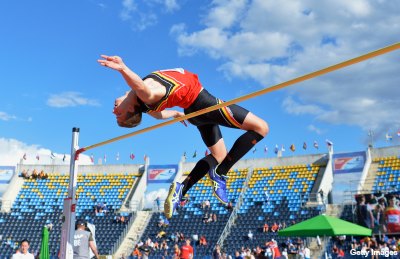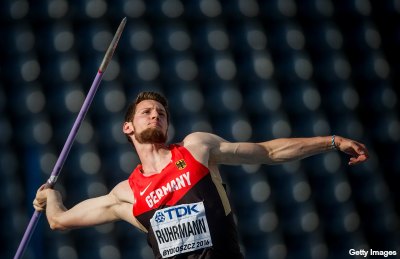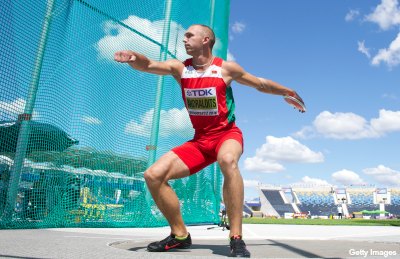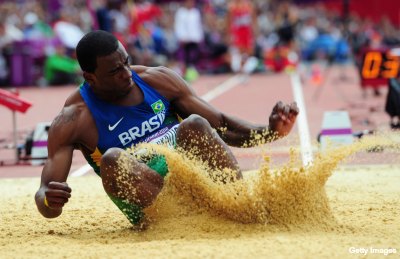Composed of 10 distinct events requiring a mix of speed, strength and stamina, the decathlon is widely viewed as the most comprehensive test of athleticism in the modern sporting world. That's why the world champion in the decathlon is awarded the mantle of "World's Greatest Athlete."
The decathlon is an athletic contest evolved from the ancient pentathlon, which was first staged in 708 B.C. in ancient Greece. In those days, the five-event competition -- featuring a discus throw, javelin throw, sprint, long jump and wrestling match -- were widely popular for their diverse test of athleticism.
More than 2,700 years later, its modern-day equivalent continues to test the world's best athletes against an impossible standard.

In the decathlon, scores are calculated according to each athlete's time or distance recorded for each event. Winning an event, then, is more or less meaningless -- it doesn't garner an athlete any additional points, other than the reassurance that they've earned more points than any of their competition. When decathletes are running the track, or attempting the high jump, or throwing the javelin, they're competing alongside one another, and measured according to their respective point totals.
But what they're really competing against are much more imposing: Time, distance and their own personal limitations.
Because of its scoring table, it's theoretically possible to win a decathlon competition without winning a single event. And that makes it one of the ultimate balancing acts in sports: Instead of being the best at a few events, decathletes want to post a strong performance across every category, weighing the potential points earned against the training time required.
All this to say: Decathlon training is a mess of time management, with athletes and coaches carefully choosing when to train for a given event, and gauging how much time they're willing to invest into any one competition.

"There is so, so much of that," says reigning Olympic champion Ashton Eaton says of the time spent building training plans. "Luckily, I am so fortunate to have a coach [Harry Marra] who is the absolute hands-down expert in doing that for decathletes. So every single day, we lay out a plan for an entire year. And then we'll break it down by month, and then by week to accomplish the month-long goals.
"It keeps going down like that, until we plan out every day."
It's a never-ending juggling act, and one in which perfection is all but impossible. With each event offering a maximum 1,000 points, a perfect performance in the decathlon would merit a score of 10,000 points. But the world record, held by Eaton, remains far away from that impossible standard, sitting at 9,045 points entering these Summer Olympic Games.
Daley Thompson knows the endless struggle that comes with preparing for 10 separate events. The former British Olympian spent the better part of a decade preparing his body for a shot at the Olympic gold medal. By the mid-1980s, he was a global track star -- but he sought the fame and accomplishment that only the Olympic Games can provide.

Pat Zeniou, a fellow decathlete and one of Thompson's training partners, described him as a difficult person to train with -- and to live with.
"When he wants to go training, he wants to go then," Zeniou told The New York Times in 1984. "If you're in the middle of lunch or watching television, it doesn't matter. His life revolves around the decathlon; he assumes that's true for everyone. It's not always."
Still, Thompson's obsessive training wasn't enough to ensure he had prepared himself for every event. In a tuneup competition for the 1984 Olympic Games, Thompson recorded a poor performance in the 400-meter run, and blamed it on his poor training for that event.

It all worked out in the end: Thompson won gold for Great Britain in 1984, and set a new world record at the Games. But the struggles experienced by a former gold medalist, and just months before the Olympic Games, shows just how difficult it is to adequately prepare for every event.
"Every day I will show up [to practice] knowing there are three things we want to get done," Eaton says. "It's constant planning and adjustment. Then that affects the rest of the week, and we have to make other adjustments."
Even after the competition begins, the strategic decision-making doesn't end. Eaton says an important aspect of the decathlon is conserving energy for other events. For example, if he records a good long jump that will net him a point total that he's comfortable with, he might choose not to take all of his available attempts, instead saving his body's strength for other events.
But he admits that in both training and competing, it can be a bit of a chess match. Performances are scrutinized, strategies are built and athletes work closely with coaches to plot find new ways to eke out a few more points.
"There's no solid data on how to do it right," Eaton says. "It's just constant tinkering."
More Olympic Games:
-- What If World's Greatest Athlete Never Discovered The Decathlon?
-- Ashton Eaton Embodies Modern Athlete's Business/Social Media Savvy
-- Lolo Jones: I'm Not Hope Solo





